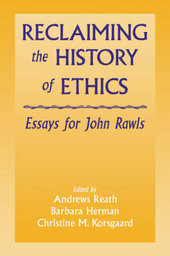
|
Reclaiming the History of Ethics: Essays for John Rawls
Paperback / softback
Main Details
| Title |
Reclaiming the History of Ethics: Essays for John Rawls
|
| Authors and Contributors |
Edited by Andrews Reath
|
|
Edited by Barbara Herman
|
|
Edited by Christine M. Korsgaard
|
| Physical Properties |
| Format:Paperback / softback | | Pages:428 | | Dimensions(mm): Height 228,Width 152 |
|
| Category/Genre | Ethics and moral philosophy |
|---|
| ISBN/Barcode |
9780521063500
|
| Classifications | Dewey:170.9 170.9 |
|---|
| Audience | | Professional & Vocational | |
|---|
| Illustrations |
Worked examples or Exercises
|
|
Publishing Details |
| Publisher |
Cambridge University Press
|
| Imprint |
Cambridge University Press
|
| Publication Date |
29 May 2008 |
| Publication Country |
United Kingdom
|
Description
The essays in this volume offer an approach to the history of moral and political philosophy that takes its inspiration from John Rawls. All the contributors are philosophers who have studied with Rawls and they offer this collection in his honour. The distinctive feature of this approach is to address substantive normative questions in moral and political philosophy through an analysis of the texts and theories of major figures in the history of the subject: Aristotle, Hobbes, Hume, Rousseau, Kant and Marx. By reconstructing the core of these theories in a way that is informed by contemporary theoretical concerns, the contributors show how the history of the subject is a resource for understanding present and perennial problems in moral and political philosophy. This outstanding collection will be of particular interest to historians of moral and political philosophy, historians of ideas, and political scientists.
ReviewsFrom the hardback review: 'Sherman has done a wonderful job in getting us to appreciate that neither Kant's nor Aristotle's ethical theories fit neatly into the categories in terms of which modern moral philosophy would have us read them. her book is philosophically sophisticated, humane, and steeped in an enviable mastery of both the Kantian and the Aristotelian corpus.' Music & Letters
|